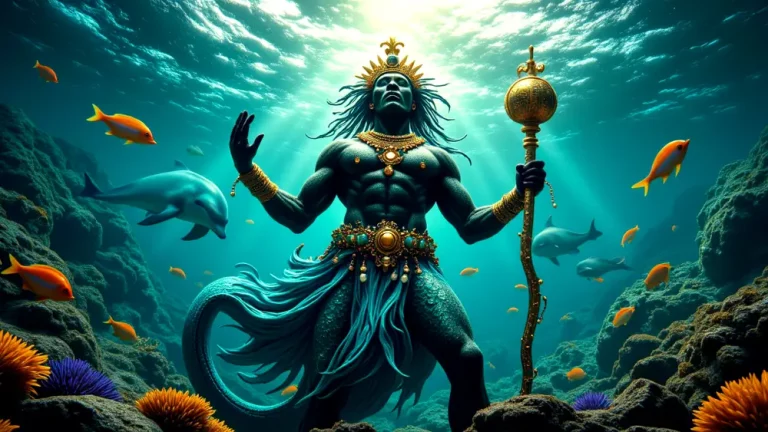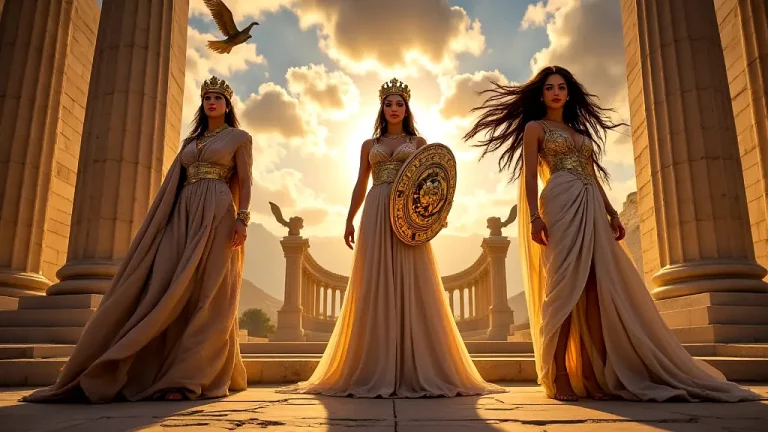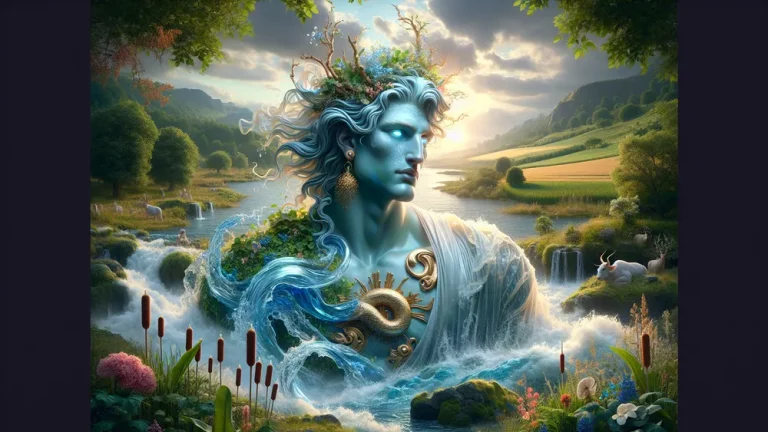Orion In Greek Mythology: The Giant Hunter And Constellation
Welcome to our look at Orion, a figure from Greek mythology that many find really interesting. Think of a brave person whose stories about daring and skill have been shared over time, somewhat like heroes of today. Orion, the giant hunter, has tales full of amazing tasks, talks with gods, and a history that goes up to the stars.
Key Points:
- Orion is a key figure in Greek mythology, known as a giant hunter with tales full of daring adventures and interactions with gods.
- His birth story varies: some accounts suggest that he is the son of Poseidon and Euryale, while others say he sprang from the ground after three gods visited a farmer named Hyrieus.
- Orion’s exploits feature prominently in myths, including clearing the island of Chios of wild beasts, battling a giant scorpion sent by Gaia, and partaking in the hunt for the Calydonian Boar.
- He had a complicated relationship with the gods, particularly his close friendship with Artemis, the goddess of the hunt, which led to tension with her brother, Apollo.
- The accounts of Orion’s death vary, with some attributing it to a scorpion sting and others to a tragic mishap involving Artemis and Apollo.
- After his death, Orion was placed in the night sky as a constellation by Zeus at Artemis’s request, making his story immortal and his legacy everlasting.
- The constellation of Orion held a practical significance for ancient Greeks, signaling the arrival of winter and guiding farming activities, thus linking mythology to daily life and nature.
In this post, we will understand Orion, from how he started and his daring trips to his connections with the gods and his sad end. Additionally, we will see how Orion’s history keeps glowing in the night sky as a group of stars, remembering how ancient Greeks viewed and celebrated this heavenly figure.
Even if you are new to Greek mythology or just want to learn more, this detailed guide gives you an in-depth and interesting look at Orion, the giant hunter and constellation.
Orion: Overview and Key Facts
| Key Fact | Description |
|---|---|
| Name | Orion |
| Parents | Changes by story; usually Poseidon (father) and Euryale (mother) |
| Birthplace | Boeotia or Chios, it depends on the myth |
| Job | Hunter |
| Important Traits | Really big, great at hunting |
| Divine Relationships | Friend of Artemis, talks with Apollo, Poseidon, and others |
| Major Myths | Birth and parents, hunting adventures, death by scorpion or Artemis |
| Death | Various versions: scorpion got him, Artemis did, or Apollo was involved |
| Star Pattern | Placed among the stars as the Orion star pattern |
| Cultural Meaning | Sign of being very good at hunting, shown in books and art |
| Legacy | Remembered forever in the night sky, important in Greek stories |
The Story of Orion
To really grasp Orion’s place in Greek myths, we need to look into the collection of stories. These stories talk about his beginnings, adventures, and how he got along with the gods.
The Beginnings of Orion
Orion’s beginnings are just as different and interesting as the stories about them. One well-known story says Orion was Poseidon’s son, and his mother was Euryale, a Gorgon. Because of his godly family background, he got amazing skills like walking on water, a gift from his dad Poseidon. Think of someone who stands out because of his special background, like Orion.
His godly family made him different from regular people and this helped make him a legendary giant hunter. But there are other stories about his birth. Another famous story says Orion was born from the ground itself. In this story, three gods – Zeus, Poseidon, and Hermes – visited a poor farmer named Hyrieus.
The gods wanted to thank him for his kindness, so they gave him a wish. He wished for a child, and the gods told him to bury a bull’s skin in the ground. From this skin, Orion came out, fully grown, very strong, and great at hunting. This story about Orion’s beginning shows how Greek myths can have many different and equally interesting versions.
Orion had two unique stories about his origin, one where he was Poseidon’s son with special abilities, and another where he emerged from the ground as a strong hunter with the help of three gods.
Orion’s Journeys and Achievements
Orion did many things that revealed his amazing skills and bravery in hunting. One well-known deed was his mission to clear the island of Chios of wild animals. Because the island had dangerous creatures, Orion, with his unmatched hunting skill, decided to clean up the place. Think of someone like a famous wildlife expert who goes into the wilderness to save animals.

In the same way, Orion’s work brought peace and safety to the people of Chios, making them respect and admire him. In other stories, Orion’s encounters with mythical creatures made him more legendary. He is often shown fighting strong beasts like the big scorpion sent by Gaia, the Earth goddess. This fight is very important because it is a story about how Orion died.
Also, Orion was so good at hunting that he had many loyal hunting dogs, and Sirius, the brightest star, was seen as his loyal dog. These stories show Orion as a protector and top-level hunter, much like a known athlete famous for their skill and hard work. In different myths, Orion’s role is not just about hunting.
He is part of other stories like his journey to the underworld to bring back Merope, his loved one, and his role in the great hunt for the Calydonian Boar. These adventures display Orion’s courage and strong will, qualities that made him admired in Greek myths.
To sum up his notable feats:
- Clearing the island of Chios of dangerous animals.
- Fighting mythical creatures like the big scorpion.
- Having loyal hunting dogs, including Sirius.
- Going to the underworld for Merope.
- Joining the hunt for the Calydonian Boar.
These stories of courage and adventure not only reveal Orion’s amazing skills but also his importance in Greek mythology.
Orion’s Bonds with the Gods
Orion’s connection with the gods is an interesting part of his story. Especially his friendship with Artemis, the goddess of the hunt. Artemis, known for her hunting skill and her vow not to marry, saw a similar spirit in Orion. Their close bond can be seen as a strong partnership between two skilled individuals who admired each other’s abilities.
They hunted everywhere together. Their combined skill made them seem unbeatable. However, their friendship was not simple. Some stories say Orion’s affection for Artemis made her brother Apollo not happy. Also, Orion’s interactions with other gods often had conflict and rivalry. One example is his encounter with Apollo, Artemis’s twin brother. Apollo, being protective of his sister and unsure about Orion’s intentions, planned to get rid of Orion.
In one version of the story, Apollo tricked Artemis into shooting an arrow at a target far away, which was Orion swimming in the sea. This sad event shows the complex relationships among the gods. Their alliances were always changing. Moreover, Orion’s bragging sometimes caused trouble with other gods. For instance, when he said he could hunt down all animals on Earth, he angered Gaia, the Earth goddess.
These events mean a web of relationships shaped Orion’s role in Greek mythology.
The Sad End of Orion
Like many Greek heroes, the story of Orion has a sad end.
How Orion Met His End
Stories about how Orion died are as different as his many adventures. One famous story is about a giant scorpion sent by Gaia, the Earth goddess. Orion said he could kill every animal on Earth, which made Gaia angry. In response, she sent a giant scorpion to fight him. The battle was fierce. Despite Orion’s great hunting skills, the scorpion stung him in the end, which led to his death.
Some stories about historical events are like this one, each giving a unique way of seeing how things happened. Another well-known story involves the gods Artemis and Apollo. As mentioned before, Apollo was wary of Orion’s friendship with his sister Artemis. In one version, Apollo, trying to protect his sister, tricked her into killing Orion.
He saw a distant target in the sea and challenged Artemis to hit it. She did not know it was Orion swimming. Her arrow hit. Orion died. This sad event shows the complicated relationships between the gods and Orion, where love, jealousy, and rivalry mixed together. These stories mean the many-sided nature of Orion’s tragic end, reflecting the detailed weave of Greek mythology.

What Happened After and His Legacy
Orion’s death had a huge effect on the stories and people involved. Artemis, because she was very sad after losing her close friend, asked Zeus to put Orion among the stars. This way of making him immortal compared to how we remember historical people by building monuments or naming places after them. Putting Orion in the night sky as a constellation made sure his story would last forever.
It was a constant reminder of his adventures and his complex relationships with the gods. His legacy kept influencing Greek myths. Also, his constellation became a significant part of ancient Greek stargazing and storytelling, which means his myth stayed important for a long time.
Orion’s legacy continued through the ages as his story was immortalized in the stars, making his adventures and relationships with the gods a permanent part of Greek myths and stargazing traditions.
Orion as a Star Picture
Orion’s legacy in the form of a star picture means he is still thought of in Greek stories.
The Meaning Behind the Orion Constellation
When Orion tragically died, the gods wanted to honor him by placing him in the stars. According to the myth, Zeus, the king of the gods, listened to Artemis’s plea and made Orion into a star picture. This way of putting a hero in the night sky is like how we build statues or memorials today to remember important people.
The constellation of Orion is one of the most recognizable in the night sky. Everyone can see its belt of three stars. His placement in the sky made sure that his legacy was always there to remind people of his adventures and the complex relationships he had with the gods. The importance of the constellation in Greek mythology goes beyond just being easy to see.

It means the long-lasting nature of Orion’s myth and his role as a great hunter. In ancient Greek culture, the constellation was connected to the changing seasons and was used to help with farming activities. For example, seeing Orion in the night sky meant winter was coming, guiding farmers in their seasonal work.
This practical use of the constellation shows how it was important in daily Greek life, connecting myths to regular life and nature. Orion’s placement among the stars thus served both to remember him and to help in everyday tasks, showing the deep connection between mythology and the natural world in ancient Greece.
Ancient Greek Stargazing and Orion
In ancient Greece, the constellation of Orion was an important sign in the night sky that guided various activities. The Greeks used Orion to know when winter was coming, and his sighting announced the time for some farming tasks. We can compare this practical use of the constellation to how modern farmers check almanacs and weather forecasts. The Greeks also saw Orion as a sign of strength and hunting skill, since he was known in myths as a great hunter. To illustrate, here is a table comparing how different cultures saw Orion:
| Culture | Interpretation of Orion | Importance |
|---|---|---|
| Ancient Greece | Great hunter, winter marker | Farm sign, symbol of strength |
| Ancient Egypt | Linked to Osiris, god of the afterlife | Sign of rebirth and eternal life |
| Babylonian | Called “The Heavenly Shepherd” | Guardian of flocks and herds |
| Native American | Some tribes saw it as a great hunter or warrior | Seasonal sign, symbol of bravery |
Different cultures had their own unique views of the Orion constellation, each giving it special meanings. For example, the ancient Egyptians linked Orion with Osiris, the god of the afterlife, seeing the constellation as a sign of rebirth and eternal life. The Babylonians called Orion “The Heavenly Shepherd” and saw it as the guardian of flocks and herds.
Native American tribes had different views, with some seeing Orion as a great hunter or warrior, using it as a sign of the seasons and a symbol of bravery. These different societies created their own stories and meanings around Orion, showing the widespread interest in this constellation and its important place in the night sky.

Orion in Greek Daily Life
In ancient Greece, Orion was very important in their culture. He stood for strength, hunting skill, and changing seasons. His presence was noticed in many parts of daily life. For example, farmers would look to the night sky to see his constellation, knowing it meant winter was coming so they could start working on their fields.

Orion was often mentioned in stories, like in Homer’s “Iliad” and “Odyssey,” where his hunting skills and adventures were talked about. Interestingly, he was also a popular subject in Greek art. You could see him on pottery, mosaics, and sculptures. He was often shown wielding a club or hunting with his dog, Sirius.
These pieces of art were not only decorative, but also reminders of the important stories that shaped Greek cultural identity, connecting daily life to their beliefs and heroes.
Pantheon of Greek Mythological Heroes and Figures
Greek mythology has many heroes and characters, each with their own unique stories, traits, and importance. Starting with mighty Hercules and his big twelve tasks and the clever things Odysseus did to get back home. These heroes have been interesting to people for thousands of years. Often, they are shown in stories, art, and plays as symbols of human strengths and weaknesses.
To see many of these interesting characters, you can check out this list of all the Greek Mythological Heroes and Figures. This list gives lots of details and stories about each person. This big resource helps us understand the mythical world that has had a big impact on Western culture and storytelling.
FAQs
1. Who were Orion’s parents according to Greek mythology?
Orion’s parents according to Greek mythology are often cited as Poseidon, the god of the sea, and Euryale, a daughter of King Minos, though other versions suggest he was born from the earth after three gods urinated on a bull’s hide.
2. What were some of Orion’s most famous adventures?
Some of Orion’s most famous adventures include his hunting exploits and encounters with mythical creatures such as the giant scorpion sent by Gaia.
3. How did Orion die according to Greek mythology?
How Orion died according to Greek mythology varies, but most commonly, he was killed by Artemis or a giant scorpion sent by Apollo.
4. Why is Orion significant in Greek mythology?
Orion is significant in Greek mythology because he embodies the archetype of the heroic hunter and is immortalized as a prominent constellation.







